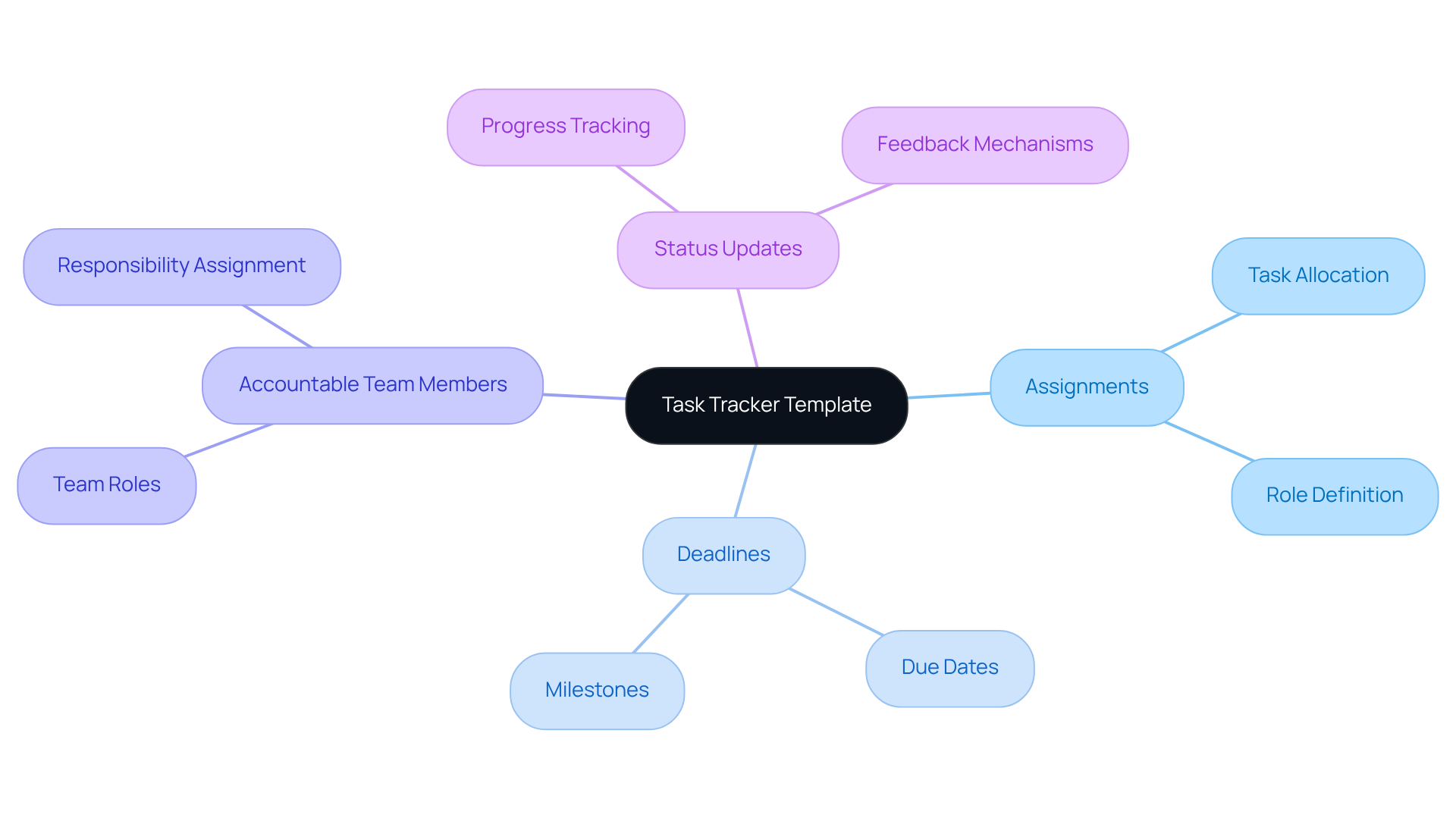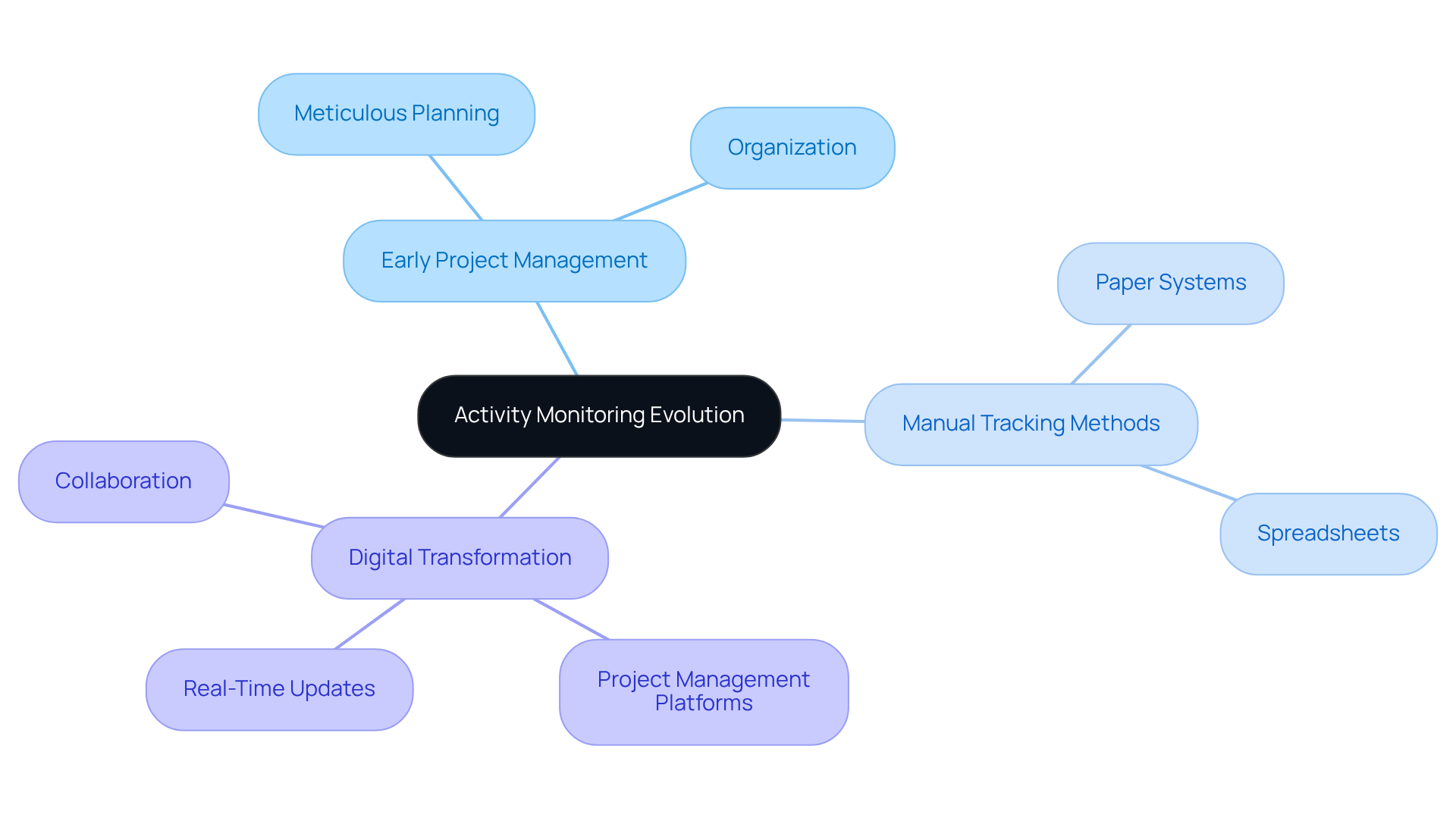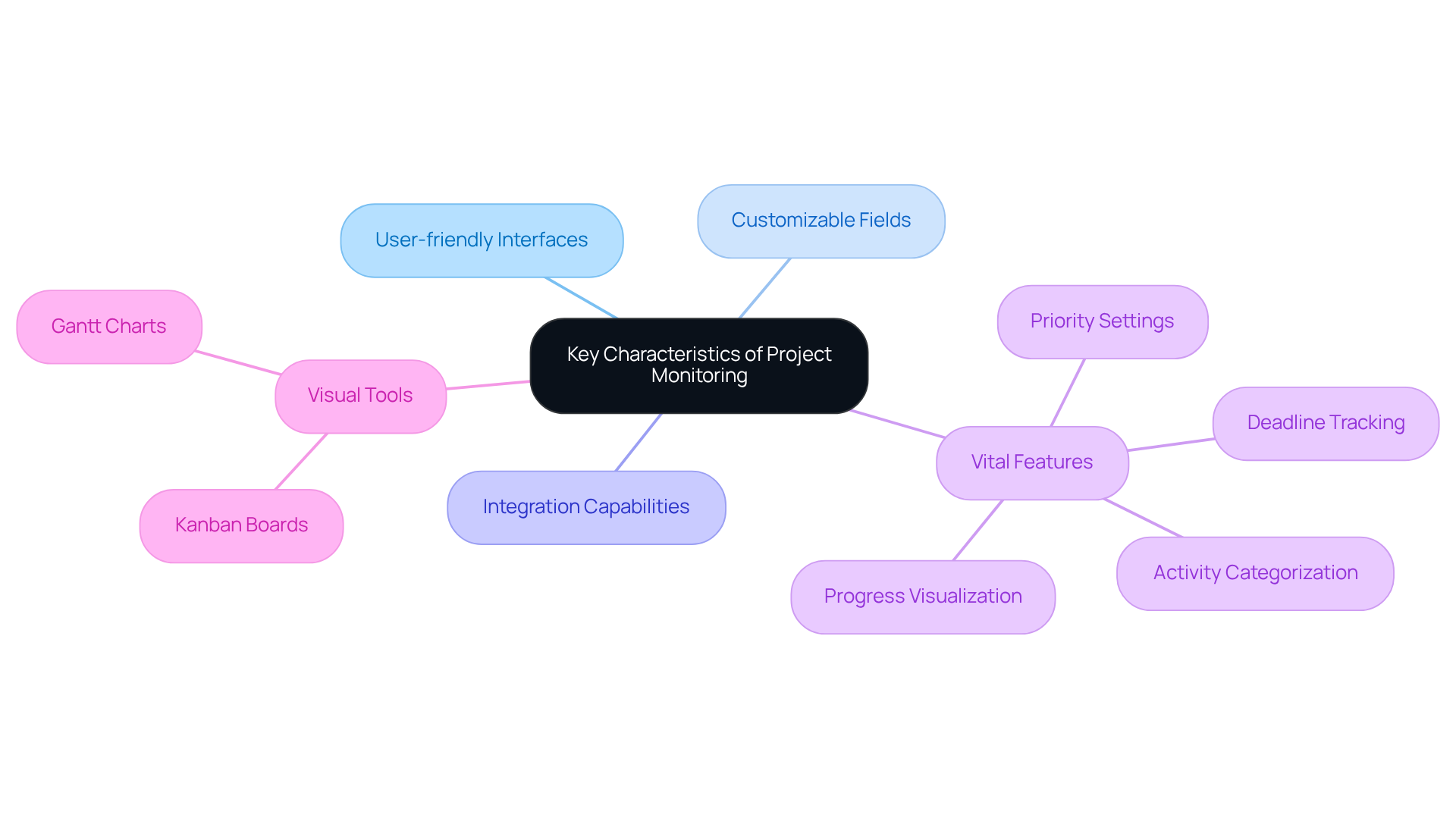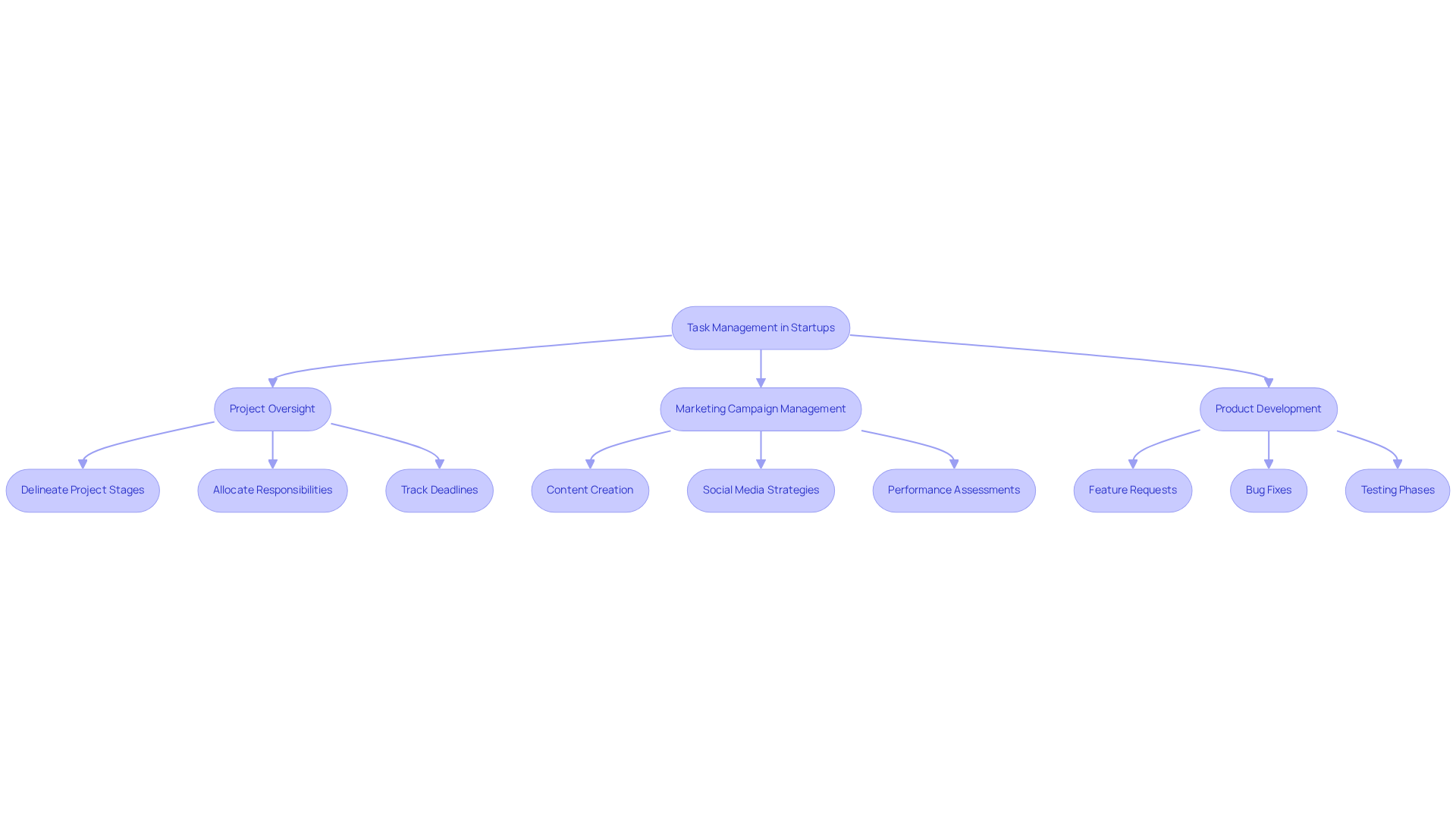Overview
This article examines how a task tracker template can significantly enhance project management for startups by offering a structured framework for task allocation, deadline tracking, and accountability. By highlighting the adaptability of these templates in dynamic environments, it underscores their effectiveness in minimizing miscommunication. Furthermore, it explores their essential role in fostering collaboration and boosting productivity among team members.
Are you struggling with task management in your startup? The right template can transform your approach. These tools not only streamline processes but also create a culture of accountability. As you implement these systems, you will likely notice a marked improvement in team dynamics and project outcomes.
In conclusion, adopting a task tracker template is not just a procedural change; it is a strategic move that can propel your startup toward success. Consider integrating these templates into your workflow to experience the full range of benefits they offer.
Introduction
In the fast-paced world of startups, every decision can significantly impact success. Therefore, the importance of an organized approach to project management cannot be overstated. A task tracker template emerges as a vital tool, providing a structured framework that enhances team collaboration, accountability, and efficiency. Yet, with numerous options available, how can startups determine which template best aligns with their unique workflows and needs? Exploring the nuances of task tracker templates not only reveals their transformative potential but also highlights the critical factors that can elevate project management practices in dynamic environments.
Define Task Tracker Template
A management framework serves as an organized resource designed to assist individuals and groups in effectively arranging, prioritizing, and overseeing activities during an initiative. The task tracker template typically includes sections detailing assignments, deadlines, accountable team members, and status updates. By providing a visual representation of activities, these frameworks enhance time management and accountability, ensuring all team members are aligned on project objectives and schedules.
How can such a framework transform your project management approach? A task tracker template can be customized for task management to suit diverse workflows, making it adaptable across various sectors. This adaptability is particularly crucial in dynamic startup environments, where flexibility is essential for success.
By implementing a management framework, you not only streamline processes but also foster a culture of responsibility and collaboration within your team. Consider the impact of improved synchronization on your project outcomes—can you afford to overlook this critical element?

Contextualize Importance for Startups
In the dynamic startup environment, where teams navigate tight deadlines and limited resources, a task tracker template is essential for maintaining organization and focus. These frameworks act as a task tracker template that facilitates the oversight of multiple projects simultaneously, ensuring that tasks are clearly defined and assigned. As Uma Kelath, a Staff Content Editor, notes, "An Excel assignment organizer template is a pre-designed spreadsheet that offers a structured framework for managing and monitoring activities." By leveraging project monitors, startups can significantly minimize the risk of miscommunication and workload overload, allowing team members to concentrate on their core responsibilities. Furthermore, these tools provide enhanced visibility into progress, crucial for making informed decisions and timely adjustments.
With the average individual managing around 15 concurrent objectives and initiatives, the organized system offered by a task tracker template becomes indispensable for prioritizing tasks and optimizing workflow. For instance, the Daily and Monthly Activity Tracker by Template.net delivers a dashboard view that simplifies management, enabling teams to track status and adjust priorities based on monthly insights. This level of organization not only streamlines operations but also cultivates a culture of accountability and efficiency, ultimately boosting productivity in startups. Additionally, the Excel Project Tracker Template by Team Gantt enhances real-time collaboration and management for small teams, further reinforcing the advantages of project trackers in the startup landscape.
![]()
Trace the Origins and Evolution
The concept of activity monitoring has its roots in early project management methodologies, which underscored the significance of meticulous planning and organization. Initially, tracking activities was a manual endeavor, reliant on paper systems or rudimentary spreadsheets. However, the advent of digital tools and applications has transformed project organization formats significantly. Today, these methodologies are seamlessly integrated into various project management platforms, facilitating real-time updates and collaboration. This evolution not only signifies a shift towards automation but also reflects a growing emphasis on efficiency in the workplace, particularly among startups that prioritize agility and responsiveness to market dynamics.
How can your organization leverage these advancements to enhance productivity and drive success?

Identify Key Characteristics and Features
Efficient project monitor designs are characterized by user-friendly interfaces, customizable fields, and robust integration capabilities with other tools. These vital features often encompass:
- Activity categorization
- Deadline tracking
- Priority settings
- Progress visualization
Consider frameworks that support Kanban boards or Gantt charts; they provide visual signals that significantly enhance project management. Moreover, the ability to allocate tasks to team members and monitor their status in real-time is crucial for maintaining accountability and ensuring that initiatives stay on track. Startups must seek models that align with their specific workflows and team dynamics to boost productivity. Are you ready to elevate your project management approach?

Explore Practical Applications in Startup Environments
Task management formats serve as vital resources in startup environments, fostering efficient project oversight by enabling teams to delineate project stages, allocate responsibilities, and effectively track deadlines. In the realm of marketing, these frameworks streamline campaign management, organizing activities related to content creation, social media strategies, and performance assessments, ensuring that every aspect of a campaign is executed seamlessly. Furthermore, product development teams can leverage work monitors to manage feature requests, address bug fixes, and coordinate testing phases. By customizing tracker templates to fit their unique workflows, startups can significantly enhance collaboration, improve communication, and ultimately drive success.
Casy's platform elevates this process by automatically capturing essential information from conversations, generating tasks, establishing deadlines, and updating documents without the need for manual input. This functionality tackles prevalent challenges, such as the strain of manual updates and the necessity for constant coordination, allowing teams to concentrate on their primary objectives. The versatility of Casy's platform across various workflows positions it as an optimal solution for startups aiming to refine their project management practices.

Conclusion
The task tracker template stands as an essential tool for startups, providing a structured approach to project management that significantly enhances organization and accountability. By embracing this framework, teams can streamline their processes, ensuring that responsibilities are clearly defined and deadlines are met. This ultimately fosters a more collaborative and efficient work environment.
Key points throughout the article highlight the adaptability of task tracker templates across various sectors, particularly in dynamic startup settings. These templates not only minimize miscommunication but also offer valuable insights for informed decision-making. From the historical evolution of project management methods to the essential features that characterize effective trackers, the discussion underscores the importance of utilizing these tools to optimize workflow and productivity.
In a landscape where agility and responsiveness are paramount, startups must recognize task tracking as a fundamental practice. By leveraging the capabilities of task tracker templates, organizations can enhance their project management strategies, cultivate a culture of accountability, and ultimately drive their success. The time to implement these frameworks is now—ensure your team is equipped to navigate the complexities of project management with both confidence and clarity.
Frequently Asked Questions
What is a task tracker template?
A task tracker template is a management framework designed to help individuals and teams organize, prioritize, and oversee activities during a project. It typically includes sections for assignments, deadlines, accountable team members, and status updates.
How does a task tracker template enhance project management?
It provides a visual representation of activities, improving time management and accountability, ensuring all team members are aligned on project objectives and schedules.
Why is a task tracker template important for startups?
In dynamic startup environments, a task tracker template helps maintain organization and focus, allowing teams to manage multiple projects simultaneously and minimizing the risk of miscommunication and workload overload.
How does a task tracker template facilitate team collaboration?
By providing a structured framework for managing tasks, it fosters a culture of responsibility and collaboration, enhancing visibility into progress and enabling informed decision-making.
What are some specific examples of task tracker templates?
Examples include the Daily and Monthly Activity Tracker by Template.net, which offers a dashboard view for tracking status and adjusting priorities, and the Excel Project Tracker Template by Team Gantt, which enhances real-time collaboration for small teams.
How many tasks do individuals typically manage at once?
The average individual manages around 15 concurrent objectives and initiatives, making an organized system like a task tracker template essential for prioritizing tasks and optimizing workflow.




